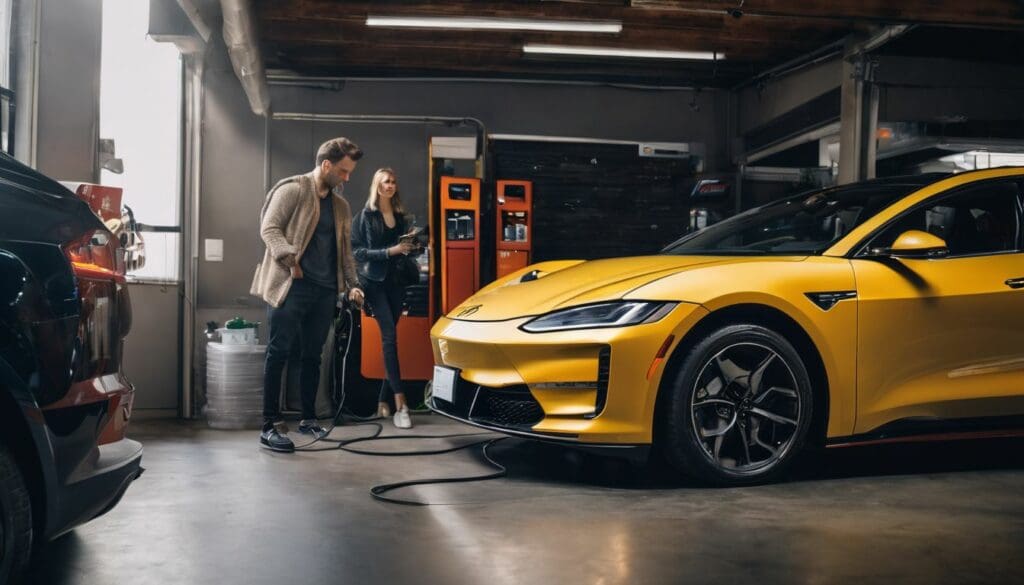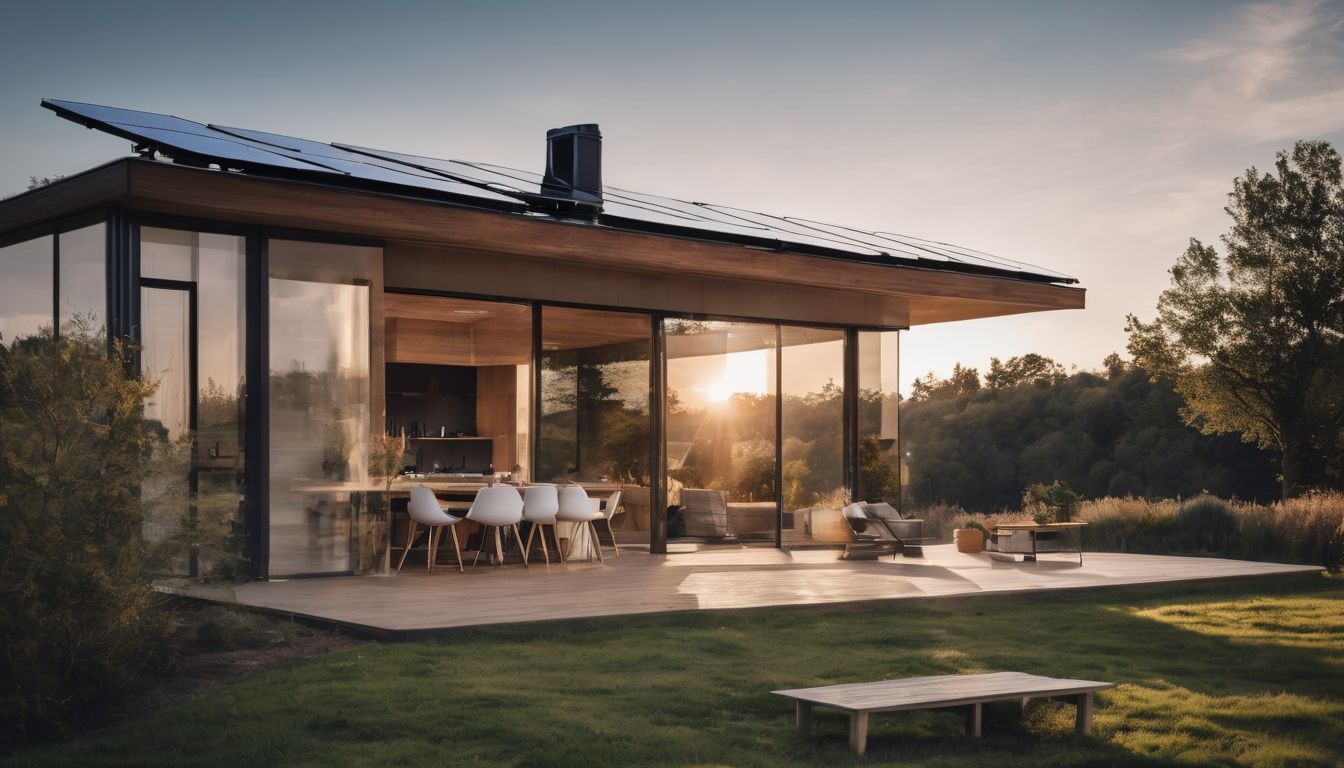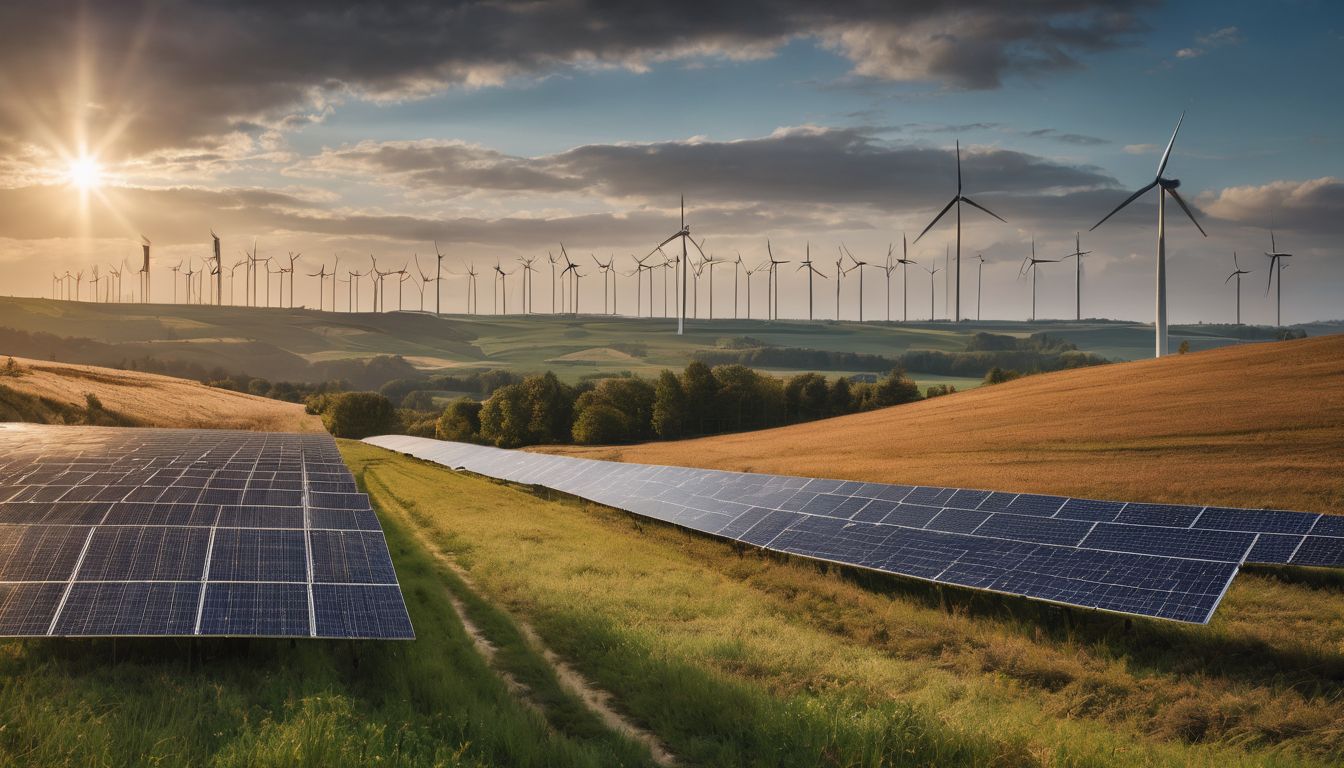As electric vehicles (EVs) gain popularity, many wonder how charging them at home will affect their electricity bill. On average, an EV might increase a household’s energy use by about 20%.
Our blog post dives into practical tips and strategies to manage and minimise the impact of your EV on your home energy consumption. Keep reading to steer your power usage in a cost-effective direction.
Key Takeaways
- Electric vehicles can increase a household’s energy usage by approximately 20%, leading to higher electricity bills.
- Scheduling EV charging during off – peak hours, using smart charging equipment, and installing solar panels are effective ways to manage energy costs.
- Calculating the cost of charging an EV involves understanding your electricity rate, considering charging time and efficiency, and taking into account off-peak rates.
- Governments offer incentives and rebates for installing EV charging stations at home, which can help offset the initial expenses associated with electric vehicle ownership.
- As more people adopt electric cars, it is increasingly important to monitor energy consumption and invest in efficient technologies to maintain sustainable home energy use.
Understanding Electric Vehicles
The Electric Vehicle Revolution is impacting home energy consumption in significant ways. As more people switch to electric cars, it’s important to understand their impact on household energy use and how to manage it effectively.
The Electric Vehicle Revolution
Electric vehicles are driving a major shift in how we use energy at home. With rising numbers of environmentally conscious individuals opting for these sustainable transport options, electric car charging infrastructure is becoming an integral part of modern households.
Charging an electric vehicle (EV) can significantly affect your home electricity bills, demanding smarter approaches to energy consumption and management.
Upgrading to cleaner transportation means new challenges and opportunities in balancing our home’s energy usage. Homeowners are exploring innovative ways to integrate EV charging with renewable energy sources like solar panels while keeping costs down.
As more people join the revolution and switch their petrol or diesel cars for electric ones, our next focus becomes understanding how this transition impacts overall household electricity consumption.
The Impact of Electric Cars on Home Energy Consumption
Electric cars have a significant impact on home energy consumption. As more households transition to electric vehicles, the demand for electricity increases. Charging an electric car at home contributes to higher energy usage, affecting household electricity bills and overall energy consumption.
Consequently, it’s essential for environmentally conscious individuals to consider the implications of electric vehicle charging on their home energy use.
To mitigate the impact of electric cars on home energy consumption, homeowners can implement efficient charging strategies and invest in smart charging equipment. Scheduling EV charging during off-peak hours and utilising solar panels can help minimise the additional load on the grid while reducing costs associated with electric vehicle charging at home.
Key Takeaways
Electric vehicles can impact home energy use in several ways. By understanding the charging costs and implementing efficient strategies, such as scheduling charging during off-peak hours and investing in smart charging equipment, homeowners can manage their electricity consumption effectively.
Additionally, utilising solar panels and monitoring energy consumption are essential steps towards reducing the overall energy demand of electric cars. As the future holds promises for more incentives and rebates, it is crucial to stay informed about the evolving landscape of electric vehicles and their impact on household energy consumption.
Moving forward, exploring cost-effective solutions for home charging stations and embracing advancements in smart grid technology will further improve the efficiency of integrating electric vehicles with household electricity usage.
The Cost of Charging Your EV
Understanding the cost of charging your electric vehicle is important for managing home energy expenses. By calculating and minimising charging costs, you can make informed decisions about your EV usage.
Calculating Charging Costs
Calculating the cost of charging your electric vehicle is crucial for managing your home energy expenses.
- Determine Your Electricity Rate: Identify the cost per kilowatt-hour (kWh) from your electricity bill to calculate the charging cost accurately.
- Calculate Charging Time: Knowing the time it takes to fully charge your EV and considering the energy consumption during that period helps in estimating the cost.
- Factor in Charging Efficiency: Consider the efficiency of your charging equipment to account for any energy losses during charging.
- Monitor Charging Frequency: Keep track of how often you charge your EV to get an overall picture of your charging costs over time.
- Consider Off-Peak Rates: Take advantage of off-peak electricity rates, if available, to reduce your charging costs even further.
- Include Miscellaneous Costs: Account for any additional fees or taxes associated with using electricity for charging your electric vehicle.
Minimising Charging Costs
After understanding the charging costs, it is essential to consider strategies for minimising these expenses. In order to minimise charging costs while using electric vehicles, you can consider the following strategies:
- Scheduling Charging During Off-Peak Hours: Utilise off-peak hours for charging your electric vehicle, as electricity rates are often lower during these times.
- Investing in Smart Charging Equipment: Consider investing in smart charging equipment that allows you to take advantage of cheaper electricity rates and optimise charging times.
- Utilising Solar Panels: If feasible, harness the power of solar energy by installing solar panels at home to reduce reliance on grid electricity for charging.
- Monitoring Energy Consumption: Keep track of your energy consumption and adjust your charging habits accordingly to avoid unnecessary costs.
- Efficient Home Charging Strategies: Adopt efficient home charging strategies such as maintaining optimal battery levels, reducing vampire loads, and utilising energy storage systems if applicable.
Efficient Home Charging Strategies
Scheduling charging during off-peak hours, investing in smart charging equipment, and utilising solar panels can all help to minimise the impact of electric vehicles on home energy use.
These strategies are essential for ensuring efficient and cost-effective charging solutions for electric vehicle owners.
Scheduling Charging During Off-Peak Hours
During off-peak hours, you can schedule your electric vehicle (EV) charging to maximise cost savings and reduce strain on the grid. To take advantage of off-peak electricity rates while charging your EV, consider the following strategies:
- Set a timer on your EV charger to start during off – peak hours when electricity demand is lower, usually late at night or early in the morning.
- Use smart charging technology that automatically schedules your EV to charge during off-peak periods, optimising energy costs and reducing peak-time strain on the grid.
- Consider installing a home energy management system that enables you to monitor and control your EV charging schedule remotely, ensuring it aligns with off-peak hours for maximum efficiency and savings.
- Explore time-of-use tariffs offered by energy providers to take advantage of discounted rates during off-peak periods for charging your electric vehicle.
Investing in Smart Charging Equipment
- Smart charging stations allow you to schedule and monitor charging remotely, optimising energy use and costs.
- These systems often come with smartphone apps that provide real – time data on your EV’s energy consumption, helping you make informed decisions.
- Some smart chargers offer load management features that distribute energy usage evenly, reducing strain on the grid during peak hours.
- Advanced models may also have integration capabilities with home energy management systems, maximising overall efficiency.
Utilising Solar Panels
Utilising Solar Panels
- Harnessing solar energy: By installing solar panels on the roof of your home, you can tap into a sustainable source of energy to charge your electric vehicle.
- Offsetting electricity usage: Solar panels can compensate for the energy used to charge your EV, lowering your overall reliance on grid electricity and reducing home energy bills.
- Environmental benefits: Utilising solar panels contributes to a greener environment by reducing the consumption of non-renewable resources and cutting down on greenhouse gas emissions.
- Return on investment: Over time, the savings from using solar energy to charge your EV can offset the initial cost of installing solar panels, offering long-term financial benefits.
Monitoring Energy Consumption
- Install a smart energy monitor to track your electricity usage in real-time, helping you identify peak consumption periods and make adjustments.
- Utilise energy management software to analyse historical data and identify patterns, enabling you to optimise charging schedules and minimise costs.
- Implement smart meters to gain insight into your electricity usage, allowing you to make informed decisions about charging your electric vehicle during off-peak hours.
- Consider integrating home automation systems to control and monitor energy usage remotely, ensuring efficient charging and overall electricity consumption.
Incentives and Rebates
To promote the use of electric vehicles and reduce home energy use, many governments offer incentives and rebates for installing charging stations or transitioning to electric cars.
Understanding these incentives can help you make informed decisions about your home energy usage.
Understanding Home Energy Bills
Electric vehicle owners need to understand the impact of charging their cars on home energy bills. Charging an electric car at home can significantly increase monthly electricity usage and lead to higher bills.
It’s important for EV owners to monitor their energy consumption, make use of off-peak charging hours, and consider investing in smart charging equipment to manage costs effectively.
Furthermore, utilising renewable energy sources such as solar panels can also help reduce the overall impact on home energy bills. Understanding the correlation between electric vehicle charging and household electricity consumption is crucial for making informed decisions about managing expenses while supporting environmental sustainability efforts.
Future of Electric Cars and Home Energy
The future of electric cars and home energy is intertwined. As the adoption of electric vehicles (EVs) continues to grow, so does the need for efficient home charging strategies. Investing in smart charging equipment can help minimise charging costs by scheduling charging during off-peak hours.
Moreover, utilising solar panels can further reduce household electricity consumption when powering EVs.
Furthermore, as governments and utility companies focus on building robust electric vehicle charging infrastructure, homeowners can expect more incentives and rebates that align with their environmentally conscious values.
Conclusion
In conclusion, electric vehicles have a significant impact on home energy use. They can increase electricity demand and affect household energy bills. Homeowners can adopt efficient charging strategies to minimise costs and even benefit from incentives and rebates.
As the electric vehicle revolution continues, it’s essential for individuals to understand the implications and explore smart solutions for managing their home energy consumption effectively.
FAQs
1. How do electric vehicles affect home energy use?
Electric cars can increase household electricity consumption as they require charging, which might impact your electricity demand and bills.
2. What are the costs of charging an electric vehicle at home?
The cost to charge an electric car at home depends on several factors like your EV’s energy efficiency and the price of electricity but is generally cheaper than refueling with petrol or diesel.
3. Can electric cars lead to higher energy bills?
Yes, without efficient energy management, adding electric vehicle charging to your usual home energy use could result in higher electricity bills.
4. Are there solutions for managing the extra energy used by electric cars?
Absolutely! There are smart charging solutions that help manage when and how you charge your EV to ensure better electric car energy consumption analysis and reduce expenses.
5. Does owning an EV mean I will consume more power overall?
Possibly, since electric vehicles draw power from your home for charging; however, their overall impact on household electricity consumption can be controlled through various efficient vehicle and charger options.





